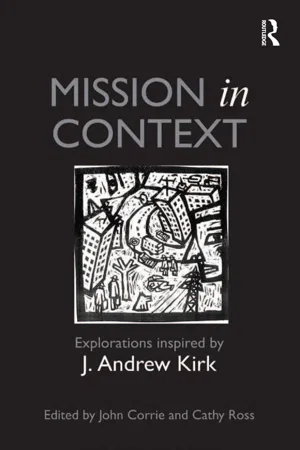
- 270 pages
- English
- ePUB (mobile friendly)
- Available on iOS & Android
About This Book
Stimulated by Andrew Kirk's mission theology, this book brings fresh theological reflection to a wide range of mission issues. A formidable group of international missiologists are drawn together to explore current reflections on a wide range of issues including: poverty and injustice, environmentalism, secularism, the place of scripture in a pluralist culture, science and faith, liberation theology, oppression and reconciliation, and much more. Kirk's influence and reputation is international, and extends to South America, USA, Eastern Europe, Africa and SE Asia. Latin American mission has been especially enriched by Kirk's innovative thinking on revolutionary politics, contextualisation and holistic mission. This is an indispensable resource of up-to-date missiological reflections for all involved in mission at every level.
Frequently asked questions
Information
PART 1 J. Andrew Kirk: His Life and Work
1 Missiologist and Theologian
Test all things …1 Thess 5:21
Introduction and Context
The theology of mission is a disciplined study which deals with questions that arise when people of faith seek to understand and fulfil God’s purposes in the world, as these are demonstrated in the ministry of Jesus Christ. It is a critical reflection on attitudes and actions adopted by Christians in pursuit of the missionary mandate. Its task is to validate, correct and establish on better foundations the entire practice of mission.2
Apologetics
In order to know what is just in a person-to-person encounter, love listens. It is its first task to listen. No human relation, especially no intimate one, is possible without mutual listening … All things and all men [sic], so to speak, call on us with small or loud voices. They want us to listen, they want us to understand their intrinsic claims, their justice of being. They want justice from us. But we can give it to them only through love which listens … Listening love is the first step to justice in person-to-person encounters.11
Table of contents
- Cover Page
- Half Title Page
- Title Page
- Copyright Page
- Dedication
- Contents
- Notes on Contributors
- Foreword
- Preface
- Introduction
- PART I: J. ANDREW KIRK: HIS LIFE AND WORK
- PART II: WHAT IS MISSION?
- PART III: TRUTH IN A PLURALISTIC WORLD
- PART IV: CULTURE, EDUCATION AND RELIGION
- Index